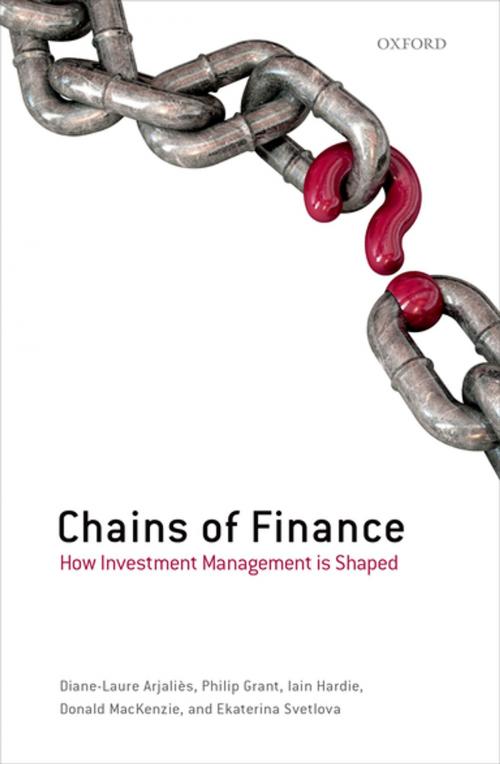Chains of Finance
How Investment Management is Shaped
Business & Finance, Management & Leadership, Management Science, Nonfiction, Social & Cultural Studies, Social Science| Author: | Diane-Laure Arjaliès, Philip Grant, Iain Hardie, Donald MacKenzie, Ekaterina Svetlova | ISBN: | 9780192524102 |
| Publisher: | OUP Oxford | Publication: | June 23, 2017 |
| Imprint: | OUP Oxford | Language: | English |
| Author: | Diane-Laure Arjaliès, Philip Grant, Iain Hardie, Donald MacKenzie, Ekaterina Svetlova |
| ISBN: | 9780192524102 |
| Publisher: | OUP Oxford |
| Publication: | June 23, 2017 |
| Imprint: | OUP Oxford |
| Language: | English |
Investment is no longer a matter of individual savers directly choosing which shares or bonds to buy. Rather, most of their money flows through a 'chain': an often extended sequence of intermediaries. What goes on in that chain is of huge importance: The world's investment managers, who are now almost as well paid as top bankers, control assets equivalent in value to around a year of total global economic output. In Chains of Finance, five social scientists discuss the ways in which the intermediaries in the chain influence each other, channel the flows of savers' money, enhance investment decisions, and form audiences for each other's performances of financially competent selves. The central argument of the book is that investment management is fashioned profoundly by the opportunities and constraints this chain creates. Whether chains constrain or enable, however, they always entangle, tying intermediaries to each other - silently and profoundly shaping the investment management industry. Chains of Finance is a novel analysis that will make students, social scientists, financial professionals, and regulators looking at the workings of financial markets in a new light. A must-read for anyone looking for insights into the decision-making processes of investment managers and those influenced by and working for them.
Investment is no longer a matter of individual savers directly choosing which shares or bonds to buy. Rather, most of their money flows through a 'chain': an often extended sequence of intermediaries. What goes on in that chain is of huge importance: The world's investment managers, who are now almost as well paid as top bankers, control assets equivalent in value to around a year of total global economic output. In Chains of Finance, five social scientists discuss the ways in which the intermediaries in the chain influence each other, channel the flows of savers' money, enhance investment decisions, and form audiences for each other's performances of financially competent selves. The central argument of the book is that investment management is fashioned profoundly by the opportunities and constraints this chain creates. Whether chains constrain or enable, however, they always entangle, tying intermediaries to each other - silently and profoundly shaping the investment management industry. Chains of Finance is a novel analysis that will make students, social scientists, financial professionals, and regulators looking at the workings of financial markets in a new light. A must-read for anyone looking for insights into the decision-making processes of investment managers and those influenced by and working for them.















